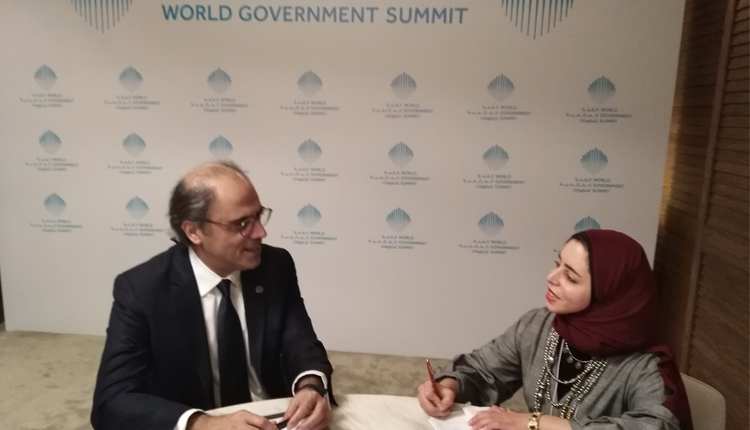INTERVIEW: IMF official says Egypt’s reform path is on track
In a closed press meeting from Dubai on the sidelines of the World Government Summit, Jihad Azour, Director of the Middle East and Central Asia Department at the International Monetary Fund (IMF), shared insights on Egypt’s upcoming monetary policy meeting, the performance of its government and policymakers, inflation expectations, and key drivers for economic growth.
When asked about the future of the Egyptian pound, Azour told Amwal Al Ghad English that the IMF does not evaluate currency levels directly. Instead, the financial institutions focuses on broader market dynamics, including supply and demand trends and the strategies implemented by policymakers to maintain economic stability.
“I believe the central bank’s policies are well-aligned with those of the Ministry of Finance. Their combined efforts aim to reduce the budget deficit, enhance liquidity, and strengthen social protection programs to alleviate burdens on lower-income groups,” Azour stated.
He emphasised that strong coordination between monetary and fiscal policies is key to boosting investor confidence, attracting foreign direct investment, and accelerating economic growth. “Egypt has immense potential, given the scale of its economy, its strategic location, and the global economic recovery,” he added.
Monetary Policy and Inflation Control
Addressing expectations for the central bank’s upcoming monetary policy meeting, Azour noted that interest rate decisions—whether to raise, lower, or maintain rates—are determined by the monetary policy committee based on prevailing economic conditions.
He commended the Central Bank of Egypt (CBE) for its decisive actions to address exchange rate volatility and implement reforms aimed at curbing inflation. “The CBE has successfully reduced inflation from over 30% to a range of 20%–22% by the end of 2017, with further gradual declines expected this year,” he explained.
Azour underscored that controlling inflation is critical for economic stability and social justice. “Inflation is one of the most pressing challenges, as it disproportionately affects all segments of society,” he said.
Egypt’s inflation peaked at nearly 35% in July following energy subsidy cuts but has since declined as the impact of the currency float subsided. By December 2017, inflation had fallen to 21.9%, down from 26% in November.
Investor Confidence and Economic Recovery
Azour praised the CBE’s reforms, stating that they have bolstered investor confidence and restored trust in Egypt’s economic trajectory. “These measures have set the stage for gradual economic recovery, with remittances from expatriate Egyptians and foreign investments in government treasury bills increasing,” he noted.
According to the latest CBE report, remittances from Egyptians abroad surged 29.3% year-on-year in December, reaching approximately $2.6 billion. Since the pound’s float in November 2016, total remittances have risen by 19.2% to $29.1 billion.
Impact of Economic Reforms on Citizens
Azour acknowledged that economic reforms have had the greatest impact on Egypt’s middle and upper-middle classes. However, he emphasised that reform is a continuous process rather than a single event. “Egypt’s reform trajectory remains on track, with both the central bank and the government taking swift measures to address inflation,” he said.
To support affected income groups, Azour stressed the importance of job creation, wage growth, and unemployment reduction. “The best way to protect the middle class is through job opportunities, enhanced investment flows, and an improved business climate,” he explained, adding that these measures will ultimately improve living standards.
Debt Management and Economic Growth
On the issue of rising debt, Azour pointed out that external and domestic debt levels are closely tied to the budget deficit. “Debt reduction can only be achieved through fiscal discipline and sustained economic growth,” he stated.
Discussing the growth rate required to have a tangible impact on citizens, Azour highlighted that economic expansion must exceed 5.5%–6% annually. “At this level, labor market stability will improve, and unemployment will gradually decline—allowing citizens to experience real economic benefits,” he noted.
Path to Sustainable Economic Development
Azour reaffirmed that Egypt has a strong opportunity to further reduce unemployment by focusing on economic growth. He referenced discussions from the IMF’s high-level conference in Marrakesh, which emphasised the need for structural reforms to drive inclusive development across the Arab world.
“Egypt’s ongoing structural reforms will help ease financial burdens on low- and middle-income citizens while creating new opportunities for private sector participation. This, in turn, will drive job creation, wage increases, and a more resilient economy,” he concluded.



